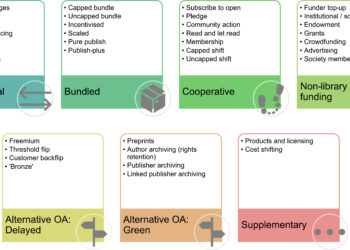Editor’s Note: Today’s post is by Mark Hooper. Mark is the Director of Tricky Goose Training, a small Australian company that designs online research training, and a Council Member for the Committee on Publication Ethics.
Open Access (OA) is the blatantly excellent idea that publicly funded research should be free to read and use by anyone. It has clear benefits for academics, for innovation, and for the public. But the OA movement has been misled by commercial interests, and misused for malevolent purposes such as predatory publishing.
This predicament has created an unhelpful divide. Some of those who notice the problems with OA wonder if its advocates are all hopelessly naïve. Conversely, some of those who observe the clear benefits of OA dismiss the problem-pointers as merely cynical or in the pocket of commercial interests. But these are thin caricatures, and we can do better.
That’s why I like this year’s Open Access Week theme, “community over commercialization”. It aims to “prioritize approaches to open scholarship that serve the best interests of the public and the academic community.”

Movements of this kind are fundamental to the history of academia. Consider that Kepler was “motivated to take control of the means of [scientific] communication so that he might manipulate it to his own benefit”. Consider that Aristotle published two versions of his work: one for scholars, and another for the public — “the ancient equivalent of open-access blogposts”. Consider that Conrad Gessner’s community of 16th Century botanists fostered community norms about data sharing such that, “collections did not really belong to any one, but were available to all.”
To me, these anecdotes are bang on theme. “Community over commercialization.”
Have you seen the Elsevier logo, by the way? It’s a tree, with a vine. The vine represents scholars and the tree represents publishers. It’s a wonderful vision of a symbiotic relationship, and very old. In the words of Erasmus, “the vine… though the most distinguished of all trees, yet needs the support of…other trees which bear no fruit…” And Erasmus would know, since he was both a distinguished scholar and a Corrector for a publishing house. The difficulty, some 500 years later, is that publishers are multi-billion-dollar corporations, and it is now much less clear who is the vine and who is the branch. When it comes to models of Open Access, it can’t hurt to check.
Anyway, it isn’t remotely naïve to advocate for OA’s clear benefits, nor is it cynical to point out the negative consequences of business models by which OA has been led astray. Anyone who finds themselves stuck on one side of that dilemma has not yet considered the matter in depth, and so thinking more on this year’s Open Access Week theme is worth our time.



